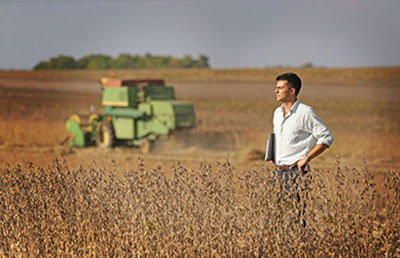Equipment Purchases, Interest and Taxes

No one likes to pay taxes. The question posed in response to a large tax bill is often “What can I buy?” My answer is generally “What do you need?”, followed by “What can you afford?”. As much as it hurts to write that check to the government, not doing it can create more long-term damage, especially with the drastic change to interest rates we have experienced. A balance is needed to maintain both tax efficiency and working capital and long-term debt management.
For instance, assume married Farmer Jones has a taxable income of $150,000 in the current year (farm income after health insurance, standard deduction and QBI). There is no other off-farm income. The marginal rate is 22% and the Farmer is subject to self-employment tax. The resulting federal tax would be $49,653 ($23,615 of income tax and $26,038 of self-employment tax). To offset, Farmer Jones decides he wants to buy a new tractor (Note the use of the word “wants”) that costs $460,000. The existing tractor works but needs some repairs. Farmer Jones does not have free cash flow to pay for the new implement and would either take an equipment note or use his line of credit. We all know interest rates have soared and gone are the days of cheap money. Input pricing is less, but so is the price of grain and any excess working capital is often needed to pay those bills. Farmer Jones can write off the tractor against income in the current year to bring income to zero for 2023 and reduce 2024 income as well if Section 179 is carried over. It will take two years of this level of income to absorb the cost of the tractor. Farmer Jones therefore saves approximately $99,306 in income and self-employment taxes. If the equipment is financed over a five year period at 8%, after five years of payments, Farmer Jones has paid the bank the $116,049 in interest, or more simply stated more than the taxes it saved him.
If Famer Jones had not purchased the tractor, he would have not increased his debt and likely been in a better working capital position when the farming cycle turns. There would be some repair costs, but not as substantial as the cash outlay for the equipment. When the tractor is traded or sold, income tax will be paid on the cash received, so the transaction is not without future tax ramifications.
Now, this is not to say that it is a bad idea to purchase equipment or spend money in general. If you need it and it will make you more profitable, it’s a worthy purchase. Spending for the sole purpose of “saving” income taxes is not generally the best decision making model. This decision was not as interesting when interest was basically free, but in our new environment there needs to be some additional analysis done before the check is written. Think about all the angles, not just how to write less of a check to the IRS.
Kelly Jackson Hardy is a certified public accountant and business advisor specializing in income taxation, accounting services, and succession planning for farmers, privately-held elevators and supply dealers, and cooperatives. Kelly is a principal with CliftonLarsonAllen in Princeton, Illinois, as well as a regular speaker at tax and estate planning seminars. Kelly was raised on a hog, row crop and cattle farm in central Illinois and has been involved in the ag industry her entire life. Kelly, her husband, and two sons are active in 4-H and operate a small feeder calf operation and pumpkin business.

Comments are closed.